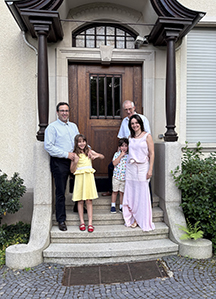Houston attorney Evan Korngold visited his paternal grandmother’s hometown of Weinheim, Germany, Aug. 16-17, when he and his family experienced an in-depth education of his family’s tragic history.
“It was very emotional seeing where they lived,” Korngold said. “They were so in love with the city and Germany. To see the betrayal was very hard. I felt very proud and lucky to be there, as I saw a vivid picture of what their lives were like.”
Knowledge of Korngold’s family history can be attributed to his great uncle, Max Hirsch, who wrote a detailed history of the Hirsch family in Weinheim, including a history of the large leather factory (Lederwerke Sigmund Hirsch) that the family founded and owned for many years.
Hirsch penned this history after he fled Germany for Portugal in the late 1930s. He eventually settled in the American Midwest.
“I thought of my grandmother (Dorothy Hirsch) a lot on this trip,” Korngold said. “What a wonderful life the Hirsch family had before it was all taken away from them. Max’s book is an amazing piece of history and shows both the terrible and good sides of people.
“The company’s largest competitor, Freudenberg Group, which still exists today, was willing to structure the deal in a way that allowed the Hirsch family to keep more money than they may have otherwise been allowed and generally acted with dignity and fairness to them, in light of the horrible laws that were imposed.”
“The book also describes backstabbers and opportunistic losers who hitched their wagons to the Nazis. The whole town turned against them, when the Hirsch family had done so much for the town.”
Weinheim, located in southwestern Germany near Mannheim, took an interest in Hirsch’s story after World War II. In fact, one Weinheim citizen decided to adapt the book into a play. That’s when the town historian invited Hirsch’s descendants, who had fled to multiple continents after the Nazis came to power, to visit.
“The play focused on Max’s grandson’s return to Weinheim in the 1990s but contained historical flashbacks showing how successful the Hirsch family was, then the painful sale of the company and the tragic departure from Germany,” Korngold said.
Korngold, 40, with his wife and two young children, made his first trip to Germany, along with six of his cousins who live in Argentina.
“The leather factory had 400 employees,” Korngold said. “The Hirsch family were leaders of the religious and secular communities. They were involved in city government and some members fought for Germany in World War I. Weinheim was a small city with a very small Jewish community. There’s no Jewish community there today.”
On Nov. 9-10, 1938, the Nazis brought the Jews of Weinheim to the front of the synagogue, which Korngold’s great-great-grandfather built. The Nazis exploded the Jews’ place of worship, forcing them to watch.
In addition, Weinheim’s Jewish men – including the Hirsch family – were arrested and sent to the Dachau concentration camp where they were subjected to horrible abuses. They also were forced to liquidate their businesses.
They were imprisoned at Dachau for up to two months and released after signing a form that stated they were treated well.
“The women in the family arranged for everything, while the men were at Dachau,” Korngold said. “They sold the family possessions and fled to Argentina, Australia, the U.S., England, France and Portugal. They left to wherever they could go between 1938 and 1940.”
After the war, the Hirsch family had some contact with the post-war Weinheim leadership. In fact, the mayor would send Korngold’s grandmother an annual holiday gift. She returned to Weinheim once, in the 1980s.
“My grandmother hadn’t told me anything about her time in Weinheim,” Korngold said. “The only thing I remember her telling me is that when she left France, they were stuck on a train for three weeks. I knew some of the history from my parents and aunt.”
The play about the Hirsch family was entirely in German, but it was relatively easy to follow along, given the context, said Korngold. He also said the Weinheim residents were very welcoming, and he appreciates everything they’ve done to educate themselves about the horrors of the Holocaust.
“German people have done a lot to try to make amends, and they have a very thorough education system that discusses what happened,” Korngold said. “[However], I did not feel like I was home. It felt very foreign to me.”
The Hirsch family’s home still exists, and the current homeowner, Karl-Hermann Schuetz, was eager to welcome the Korngolds.
“I went to the home that my grandmother grew up in,” Korngold said. “I saw her bedroom. I have a picture of my grandmother playing with her dolls, and I took a picture of my 8-year-old daughter in the same spot. The man who owns the house has a photo album of my family. He welcomed us, and it was completely surreal. There’s a painting of a deer. Hirsch translates to deer in German. To see that was remarkable for me.”
Korngold even gave an interview with a Weinheim newspaper after watching the play.
“They asked how I felt, and when I told them, I felt lucky, they were surprised,” Korngold said. “I explained that so many Jews had their entire family history erased, and even though this is a tragic story, the fact that it is so accurately captured and can be used for educational purposes makes me feel lucky.”
